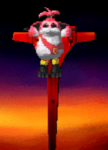PHILOSOPHY OF TREASURE DISTRIBUTION
A look at why, when, what, where and how to reward players with delicious mouth-watering treasure.
 The Real Brickroad
The Real Brickroad- 06/22/2009 12:00 AM
- 10663 views
Philosophy of Treasure Distribution
a game design article by that guy Brickroad
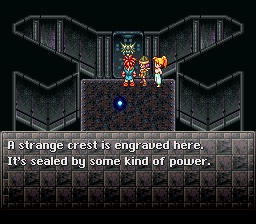
Why to Give
In an RPG, players subsist on a series of rewards. If the player pushes through this dungeon and defeats that boss, he will advance in the story. Thus, the player has incentive to push through this dungeon and defeat that boss.
Story alone won't keep a player going, though; gameplay rewards are essential not only to giving the player a reason to keep assaulting the new challenges, but also to develop the heroes' abilities and give a real sense that the player is accomplishing something other than simply killing time.
So the "why" of it is pretty obvious: players like shiny new toys.
This article defines treasure as any type of reward the player may find during the course of the game, be it new equipment, a pile of gold, usable items, new magic spells or special abilities, or any other type of increase in the heroes' power level. Treasure does not include things such as plot items, vehicles, or unique weapons without which the player cannot complete the game, although such things might be as rewarding (or more so) as treasure.
When to Give
This question has both a short and a long answer. The short answer is "every time the player completes some task".
The long answer, of course, is a bit more complicated. The long answer involves identifying the level of challenge associated with the task and correlating that with the ultimate payoff of the treasure. It also requires knowledge of what your game considers a "task".
Take Arcana, for example, an old dungeon-hack RPG on SNES. The game offers nothing to do except wander through claustrophobic corridors and fight monsters. All of the treasures in the game are found at the end of dead-end tunnels. So a task in Arcana is simply defined as "explore everywhere in the dungeon".
Of course, there isn't a treasure at the end of every dead-end... just enough to make you want to explore all of them.
Final Fantasy IV is a much more complex game, with a much wider variety of tasks. It still rewards you for the task of "explore everywhere in the dungeon", although many places in some dungeons can't be reached without finding secret or otherwise un-obvious passages. FFIV is also notorious for rewarding the task of "fight this monster over and over and over" with the reward of some exceedingly rare treasure with a sickingly low drop rate.
Some of Final Fantasy VI's best treasures can only be obtained by going through completely optional areas of the game world and completing entire subquests.
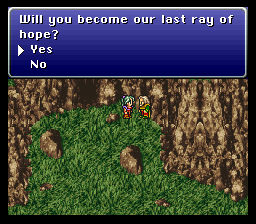
Some other tasks that are rewarded with treasure might include:
- complete this mandatory section of the game to some non-mandatory specification (example: in Final Fantasy VI there is a banquet scene which rewards you with several different types of treasures, which get better the more questions you answer "correctly"),
- use this character in your party for this scene (example: in Final Fantasy VII you can only get Barret's best weapon if Barret is in you party at a specific point in an area you can't return to once cleared),
- do this without already having done this (example: in Suikoden if you travel through a dungeon area at the beginning of the game, before doing any of the other mandatory events in the game, you are rewarded with a very helpful rune),
- pay careful attention to this (example: at a certain point in Chrono Trigger the player gains the ability to open sealed magical doors and boxes, and by remembering where these doors and boxes are located can very quickly find many powerful treasures),
- defeat this boss in a certain way (example: in Breath of Fire 2 there is a multi-section boss which, if you kill every section except one, you are rewarded with an otherwise un-obtainable method of transportation).
- do this repeatedly (example: many powerful treasures in Final Fantasy X can only be obtained by playing and winning the Blitzball minigame a certain number of times)
Of course, this is just a short list of simple tasks. Tasks might be incredibly complicated as well, requiring multiple steps (perhaps with increasingly good treasure the "deeper" one goes into the task), with varying rewards (you get this treasure at 500 points, but that treasure at 1000 points).
So, the "when" of the question is pretty simple too, at least on its face: give the player a treasure whenver they accomplish something. Of course, the "when" of it gets more complicated when you consider what kind of treasure to give for any given sort of task, which segues into my next point...
What to Give
In simplest terms, every single thing in the game that could raise the party's power level can be a treasure. This includes everything from regular items (Potions, Antidotes, what have you) to equipment (either common stuff you can buy in shops, or extremely rare one-of-a-kind stuff) to new skills or abilities. You could even go so far as to say that causing changes in the game world could be "treasures" even if they don't add to the party's power level; for example, if the player solves a minor dungeon puzzle and is rewarded with a shortcut that takes them back to the beginning of the dungeon (so they don't have to traverse the entire place if they need to go through again), he might view it as compltely worthwhile.
Since your options are so great, and the possibility exists to create any number of new items on the fly, it can be easy to get overwhelmed. You don't want to give out your best stuff early in the game, but at the same time you don't want to give away too little and always leave your players feeling broke.
Unfortunately, this question doesn't really have a short answer, like "when" does. You have to consider the difficulty of the task you're rewarding when deciding what to reward it with; you also have to consider the balance of the game.
Let's look at it in simplest terms. Assume a game involves three different tasks: A, B and C. A is the easiest task and C is the hardest. Assume the game has a weapon the hero can equip which will destroy any monster in one hit. In this game, it doesn't make sense to reward the player with such a weapon for Task A; only Task C could be challenging enough to merit such a reward.
Ah, but let us assume that the three tasks come at the beginning of the game, and not towards the end. In that cast, the set of weapons which "destroy any monster in one hit" is a much larger subset of weapons. If none of the monsters in the next few dungeons have more than 100 HP, any weapon capable of making a hero deal more than 100 damage will "destroy any monster in one hit". Given that, you probably wouldn't want to give any such weapon to the party for any task at that point in the game, whether it's as difficult as Task C or not.
Inversely, a very powerful weapon in the first few dungeons (one that requires Task C as a reward) would not be very powerful at all at endgame. So completing Task C at endgame and being reward with an obsolete weapon which the player is not even going to use is the equivalent of rewarding nothing at all.
The logical extension of this is: there is a window of time for which any given treasure is useful to the party. So when determining what kind of treasure to give for any given task, it makes sense to determine the earliest point in the game that task can be completed and decide what items are useful to the player at that point in the game.
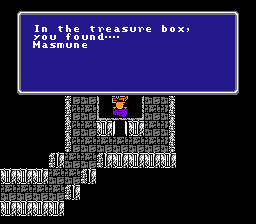
It doesn't logically follow that it makes sense to determine the latest point at which the party can complete the task, since the later in the game you are, the easier and easier the task will be to complete. If the player doesn't complete the task at his first opportunity, the reward will be less and less useful to him the longer he waits to complete it. Eventually, of course, there comes a point when the task is not worth doing at all, because the party's power level will not be increased by the reward. It is for this very reason that most sidequests you see in commercial RPGs occur at endgame, when no treasure can be made obsolete simply by the party getting stronger.
For tasks that don't get easier to complete the more powerful the party is, it might make sense to offer scaling treasures. Scaling treasures are rewards that vary depend on how well the player completes a task, or how late in the game he completes it. In the case above you might give out a different weapon for completing Task C that matches the player's current power level. Of course, this requires knowledge of your game that escapes the scope of this article.
A great example of scaling treasure comes from Chrono Trigger. There is a boss monster in the game you can fight as many times as you want, who takes a different form depending on how strong your party is (determined by their experience level). The stronger you get, the stronger the boss gets. Each form the boss takes rewards you with a new prize, which gets better as the game goes on.
There are also treasures which are not useful at all, and you should take care when giving those out. Whether or not a treasure is of any use to the party does not guarantee they will use it; any treasure which is practically useless, may as well be entirely useless. In Final Fantasy there is a spell called AMUT (Vox in later versions) which reverses the status ailment Silence. However, at no point in the game can any of your characters become Silenced! Sure, you can go into the menu and cast AMUT on yourself as much as you want, but there is never a situation in the game in which it is useful. Fortunately AMUT isn't a treasure proper; you have to buy it from a shop... but imagine someone who sells off their latest batch of goodies and spends their stockpile of gold on a spell only to find it is entirely useless.
A more recent development is for games to have entire sections of optional exploration, which are rather treasure heavy. In Kingdom Hearts there are sections of the game where you must fly through space in a Gummi Ship. The game gives you a default Gummi Ship, which is more than enough to get you through the entire game. Thus, people who don't take interest in building new Gummi Ships do not have to explore that aspect of the game. It doesn't help, then, that so many treasures in Kingdom Hearts are Gummi Blocks. A player who is not interested in building Gummi Ships has much of his exploration within the game world rewarded with -- you guessed it -- treasures which he will never put to use. He may as well have been rewarded with nothing.
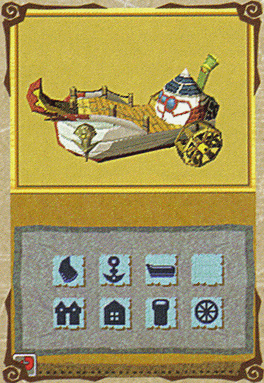
Where to Give
The actual location of treasure in your game can be important as well; if a player doesn't know where to look, he isn't going to find any.
Aside from having hidden or optional rooms in dungeons and other locations (which is a good thing), what I mean is the most basic form of finding treasure: treasure boxes, pots, bookshelves, etc. If a player doesn't know that urns in your game hide treasure at least some of the time, he's not going to think of checking any urns.
The best way around this problem is to very early on determine what objects within your world will give treasure and condition the player to search those areas. Many FFVI players know that every grandfather clock in the game hides an Elixir, probably because they thought to check a clock at one point and found an Elixir. This adds up to a great many Elixirs throughout the course of the game.
Of course, not all treasure is laying inside of a convenient box. Sometimes treasure can be laying out in the open, or in a place that is otherwise inconspicuous. In these cases it is usually handy to give the player some kind of visual clue. Chrono Trigger uses a universal "there is something here" sparkling graphic to highlight all these locations. Everything from clickable computer consoles to treasures laying in "plain sight" (from the character's perspective, anyway) uses the same sparkling graphic. Thus the player is never confused; "Oh, there's that little sparkly. Something must be there."
It might seem counterintuitive to simply say "these are the places I will hide treasure" at the beginning of the game, and then stick to them. After all, that's unrealistic. You may think, hey, in real life a key might be hidden in the drawer of a desk. So that's where you put it in the game. In order to find this key, the player has to click on the desk.
The problem is, that isn't how players think. Players don't go through games checking every single drawer, box, table, etc... just on the off-chance that there might be something there. What they do is identify places where they've been conditioned to check, and check those places. If there are a hundred desks in your game, and a key is hidden in exactly one of them, and there is no indication that a key is hidden there, the player won't know to check there. The key will never be found.
Clued treasures are treasures hidden in obscure or nonconvential places. However, these treasures all have some sort of indication as to where they are hidden. A great example of a clued treasure is in the original Dragon Quest. In your adventure, you learn that a certain important treasure is hidden at a specific set of coordinates. Later in the game you acquire an item that works like a sextant, giving your coordinates on the map. Using the item in conjunction with the clue it is relatively easy (as long as you can survive the monsters) to find this important treasure -- even though it is hidden on an otherwise plain and unmarked tile on the overworld map, amidst a maze of mountains.
It does seem obvious that all rare treasure should be hidden, since the player should be made to work for it. And in a way, that's true. However, consider that clever dungeon layout can lead to treasures the player can see but not reach -- not yet, anyway. The Legend of Zelda series uses this to great effect in almost all of its dungeons. When the player knows there's a treasure about, and works to find it, it can be more fulfilling than had he never known there was a treasure at all.
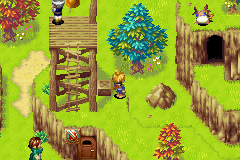
How to Give
The method of giving treasure is usually quite simple: the player finds it, and it's his. Some special and unique treasures, however, may make the "how" question more meaningful.
Consider first the possibility of treasures with various components. No one will argue that one of the most awesome and powerful treasures in Final Fantasy VII is the Knights of Round materia, the strongest magic attack in the game. However, getting this treasure isn't just as easy as walking up and taking it. First off, the treasure is hidden away on a landmass that doesn't even appear on the world map. Secondly, you can't get there by airship; you need a gold chocobo... which is in and of itself a pretty rare treasure. I could detail here the methodology of acquiring a gold chocobo, including all the various hoops you have to jump through, but suffice it to say that there are a great many steps, many of which are only barely clued and some very time- and money-consuming, just to get to the point where you can approach the Knights of Round materia. It is the payoff for learning where to find many smaller treasures and learning how to piece them together.
Consider next the possibility of options. The player can either take this treasure, or that treasure, but not both. There are many ways to present this option (and it often comes into play with two unique items that can't be found elsewhere in the game), and it really makes the player think of how each treasure is likely to benefit him, and which one will more generally increase his power level... and the answer might be different from player to player.
A variant of the "two options" idea is to use a type of point-buy system. This is where the player accumulates some form of currency (outside of the regular game currency) and redeems his "points" for more items. This option works well in many circumstances because the player can accumulate points throughout the game, and it's fairly easy to regulate how many points he's accumulating. That way the same amount of effort might be required to earn enough points for a Broad Sword early in the game as to earn enough points for a Dragonslayer Deluxe Sword by the end. It also offers the player the option to really grind for points (perhaps for hours) early on, if the Dragonslayer Deluxe is that important to him.
Now... go give!
I've briefly touched on a lot of issues in this article, all having to do with treasure distribution in RPGs. By creatively and intelligently knowing what the player is receiving, what the player is capable of receiving, and the methodology of how it's being received, treasure can be made into an important aspect of an RPG, rather than just a nice perk.
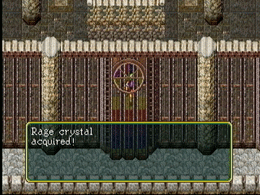
Any monkey can fill up a dozen treasure boxes with Potions, but that won't create a memorable experience for the player. Two aspects of a well-placed treasure are "How hard did I work for this?" and "How useful was this to me, once I found it?" If the player had to work hard for a treasure he ended up using to great effect, it was a valuable and memorable experience.
a game design article by that guy Brickroad

What does this sealed door contain? Perhaps... RICHES!?
~~~
Why to Give
In an RPG, players subsist on a series of rewards. If the player pushes through this dungeon and defeats that boss, he will advance in the story. Thus, the player has incentive to push through this dungeon and defeat that boss.
Story alone won't keep a player going, though; gameplay rewards are essential not only to giving the player a reason to keep assaulting the new challenges, but also to develop the heroes' abilities and give a real sense that the player is accomplishing something other than simply killing time.
So the "why" of it is pretty obvious: players like shiny new toys.
This article defines treasure as any type of reward the player may find during the course of the game, be it new equipment, a pile of gold, usable items, new magic spells or special abilities, or any other type of increase in the heroes' power level. Treasure does not include things such as plot items, vehicles, or unique weapons without which the player cannot complete the game, although such things might be as rewarding (or more so) as treasure.
~~~
When to Give
This question has both a short and a long answer. The short answer is "every time the player completes some task".
The long answer, of course, is a bit more complicated. The long answer involves identifying the level of challenge associated with the task and correlating that with the ultimate payoff of the treasure. It also requires knowledge of what your game considers a "task".
Take Arcana, for example, an old dungeon-hack RPG on SNES. The game offers nothing to do except wander through claustrophobic corridors and fight monsters. All of the treasures in the game are found at the end of dead-end tunnels. So a task in Arcana is simply defined as "explore everywhere in the dungeon".
Of course, there isn't a treasure at the end of every dead-end... just enough to make you want to explore all of them.
Final Fantasy IV is a much more complex game, with a much wider variety of tasks. It still rewards you for the task of "explore everywhere in the dungeon", although many places in some dungeons can't be reached without finding secret or otherwise un-obvious passages. FFIV is also notorious for rewarding the task of "fight this monster over and over and over" with the reward of some exceedingly rare treasure with a sickingly low drop rate.
Some of Final Fantasy VI's best treasures can only be obtained by going through completely optional areas of the game world and completing entire subquests.

Except this one, where you just have to refuse to help the good guys.
Some other tasks that are rewarded with treasure might include:
- complete this mandatory section of the game to some non-mandatory specification (example: in Final Fantasy VI there is a banquet scene which rewards you with several different types of treasures, which get better the more questions you answer "correctly"),
- use this character in your party for this scene (example: in Final Fantasy VII you can only get Barret's best weapon if Barret is in you party at a specific point in an area you can't return to once cleared),
- do this without already having done this (example: in Suikoden if you travel through a dungeon area at the beginning of the game, before doing any of the other mandatory events in the game, you are rewarded with a very helpful rune),
- pay careful attention to this (example: at a certain point in Chrono Trigger the player gains the ability to open sealed magical doors and boxes, and by remembering where these doors and boxes are located can very quickly find many powerful treasures),
- defeat this boss in a certain way (example: in Breath of Fire 2 there is a multi-section boss which, if you kill every section except one, you are rewarded with an otherwise un-obtainable method of transportation).
- do this repeatedly (example: many powerful treasures in Final Fantasy X can only be obtained by playing and winning the Blitzball minigame a certain number of times)
Of course, this is just a short list of simple tasks. Tasks might be incredibly complicated as well, requiring multiple steps (perhaps with increasingly good treasure the "deeper" one goes into the task), with varying rewards (you get this treasure at 500 points, but that treasure at 1000 points).
So, the "when" of the question is pretty simple too, at least on its face: give the player a treasure whenver they accomplish something. Of course, the "when" of it gets more complicated when you consider what kind of treasure to give for any given sort of task, which segues into my next point...
~~~
What to Give
In simplest terms, every single thing in the game that could raise the party's power level can be a treasure. This includes everything from regular items (Potions, Antidotes, what have you) to equipment (either common stuff you can buy in shops, or extremely rare one-of-a-kind stuff) to new skills or abilities. You could even go so far as to say that causing changes in the game world could be "treasures" even if they don't add to the party's power level; for example, if the player solves a minor dungeon puzzle and is rewarded with a shortcut that takes them back to the beginning of the dungeon (so they don't have to traverse the entire place if they need to go through again), he might view it as compltely worthwhile.
Since your options are so great, and the possibility exists to create any number of new items on the fly, it can be easy to get overwhelmed. You don't want to give out your best stuff early in the game, but at the same time you don't want to give away too little and always leave your players feeling broke.
Unfortunately, this question doesn't really have a short answer, like "when" does. You have to consider the difficulty of the task you're rewarding when deciding what to reward it with; you also have to consider the balance of the game.
Let's look at it in simplest terms. Assume a game involves three different tasks: A, B and C. A is the easiest task and C is the hardest. Assume the game has a weapon the hero can equip which will destroy any monster in one hit. In this game, it doesn't make sense to reward the player with such a weapon for Task A; only Task C could be challenging enough to merit such a reward.
Ah, but let us assume that the three tasks come at the beginning of the game, and not towards the end. In that cast, the set of weapons which "destroy any monster in one hit" is a much larger subset of weapons. If none of the monsters in the next few dungeons have more than 100 HP, any weapon capable of making a hero deal more than 100 damage will "destroy any monster in one hit". Given that, you probably wouldn't want to give any such weapon to the party for any task at that point in the game, whether it's as difficult as Task C or not.
Inversely, a very powerful weapon in the first few dungeons (one that requires Task C as a reward) would not be very powerful at all at endgame. So completing Task C at endgame and being reward with an obsolete weapon which the player is not even going to use is the equivalent of rewarding nothing at all.
The logical extension of this is: there is a window of time for which any given treasure is useful to the party. So when determining what kind of treasure to give for any given task, it makes sense to determine the earliest point in the game that task can be completed and decide what items are useful to the player at that point in the game.

It makes sense that the most out-of-the-way treasure box contains the most powerful weapon.
It doesn't logically follow that it makes sense to determine the latest point at which the party can complete the task, since the later in the game you are, the easier and easier the task will be to complete. If the player doesn't complete the task at his first opportunity, the reward will be less and less useful to him the longer he waits to complete it. Eventually, of course, there comes a point when the task is not worth doing at all, because the party's power level will not be increased by the reward. It is for this very reason that most sidequests you see in commercial RPGs occur at endgame, when no treasure can be made obsolete simply by the party getting stronger.
For tasks that don't get easier to complete the more powerful the party is, it might make sense to offer scaling treasures. Scaling treasures are rewards that vary depend on how well the player completes a task, or how late in the game he completes it. In the case above you might give out a different weapon for completing Task C that matches the player's current power level. Of course, this requires knowledge of your game that escapes the scope of this article.
A great example of scaling treasure comes from Chrono Trigger. There is a boss monster in the game you can fight as many times as you want, who takes a different form depending on how strong your party is (determined by their experience level). The stronger you get, the stronger the boss gets. Each form the boss takes rewards you with a new prize, which gets better as the game goes on.
There are also treasures which are not useful at all, and you should take care when giving those out. Whether or not a treasure is of any use to the party does not guarantee they will use it; any treasure which is practically useless, may as well be entirely useless. In Final Fantasy there is a spell called AMUT (Vox in later versions) which reverses the status ailment Silence. However, at no point in the game can any of your characters become Silenced! Sure, you can go into the menu and cast AMUT on yourself as much as you want, but there is never a situation in the game in which it is useful. Fortunately AMUT isn't a treasure proper; you have to buy it from a shop... but imagine someone who sells off their latest batch of goodies and spends their stockpile of gold on a spell only to find it is entirely useless.
A more recent development is for games to have entire sections of optional exploration, which are rather treasure heavy. In Kingdom Hearts there are sections of the game where you must fly through space in a Gummi Ship. The game gives you a default Gummi Ship, which is more than enough to get you through the entire game. Thus, people who don't take interest in building new Gummi Ships do not have to explore that aspect of the game. It doesn't help, then, that so many treasures in Kingdom Hearts are Gummi Blocks. A player who is not interested in building Gummi Ships has much of his exploration within the game world rewarded with -- you guessed it -- treasures which he will never put to use. He may as well have been rewarded with nothing.

Zelda: Phantom Hourglass has piles and piles of hidden ship parts to search for. Unfortunately the only thing you can do with ship parts is trade them to friends in exchange for more ship parts.
~~~
Where to Give
The actual location of treasure in your game can be important as well; if a player doesn't know where to look, he isn't going to find any.
Aside from having hidden or optional rooms in dungeons and other locations (which is a good thing), what I mean is the most basic form of finding treasure: treasure boxes, pots, bookshelves, etc. If a player doesn't know that urns in your game hide treasure at least some of the time, he's not going to think of checking any urns.
The best way around this problem is to very early on determine what objects within your world will give treasure and condition the player to search those areas. Many FFVI players know that every grandfather clock in the game hides an Elixir, probably because they thought to check a clock at one point and found an Elixir. This adds up to a great many Elixirs throughout the course of the game.
Of course, not all treasure is laying inside of a convenient box. Sometimes treasure can be laying out in the open, or in a place that is otherwise inconspicuous. In these cases it is usually handy to give the player some kind of visual clue. Chrono Trigger uses a universal "there is something here" sparkling graphic to highlight all these locations. Everything from clickable computer consoles to treasures laying in "plain sight" (from the character's perspective, anyway) uses the same sparkling graphic. Thus the player is never confused; "Oh, there's that little sparkly. Something must be there."
It might seem counterintuitive to simply say "these are the places I will hide treasure" at the beginning of the game, and then stick to them. After all, that's unrealistic. You may think, hey, in real life a key might be hidden in the drawer of a desk. So that's where you put it in the game. In order to find this key, the player has to click on the desk.
The problem is, that isn't how players think. Players don't go through games checking every single drawer, box, table, etc... just on the off-chance that there might be something there. What they do is identify places where they've been conditioned to check, and check those places. If there are a hundred desks in your game, and a key is hidden in exactly one of them, and there is no indication that a key is hidden there, the player won't know to check there. The key will never be found.
Clued treasures are treasures hidden in obscure or nonconvential places. However, these treasures all have some sort of indication as to where they are hidden. A great example of a clued treasure is in the original Dragon Quest. In your adventure, you learn that a certain important treasure is hidden at a specific set of coordinates. Later in the game you acquire an item that works like a sextant, giving your coordinates on the map. Using the item in conjunction with the clue it is relatively easy (as long as you can survive the monsters) to find this important treasure -- even though it is hidden on an otherwise plain and unmarked tile on the overworld map, amidst a maze of mountains.
It does seem obvious that all rare treasure should be hidden, since the player should be made to work for it. And in a way, that's true. However, consider that clever dungeon layout can lead to treasures the player can see but not reach -- not yet, anyway. The Legend of Zelda series uses this to great effect in almost all of its dungeons. When the player knows there's a treasure about, and works to find it, it can be more fulfilling than had he never known there was a treasure at all.

Isaac has a thing for cute little monsters, but he can't reach that one from here.
~~~
How to Give
The method of giving treasure is usually quite simple: the player finds it, and it's his. Some special and unique treasures, however, may make the "how" question more meaningful.
Consider first the possibility of treasures with various components. No one will argue that one of the most awesome and powerful treasures in Final Fantasy VII is the Knights of Round materia, the strongest magic attack in the game. However, getting this treasure isn't just as easy as walking up and taking it. First off, the treasure is hidden away on a landmass that doesn't even appear on the world map. Secondly, you can't get there by airship; you need a gold chocobo... which is in and of itself a pretty rare treasure. I could detail here the methodology of acquiring a gold chocobo, including all the various hoops you have to jump through, but suffice it to say that there are a great many steps, many of which are only barely clued and some very time- and money-consuming, just to get to the point where you can approach the Knights of Round materia. It is the payoff for learning where to find many smaller treasures and learning how to piece them together.
Consider next the possibility of options. The player can either take this treasure, or that treasure, but not both. There are many ways to present this option (and it often comes into play with two unique items that can't be found elsewhere in the game), and it really makes the player think of how each treasure is likely to benefit him, and which one will more generally increase his power level... and the answer might be different from player to player.
A variant of the "two options" idea is to use a type of point-buy system. This is where the player accumulates some form of currency (outside of the regular game currency) and redeems his "points" for more items. This option works well in many circumstances because the player can accumulate points throughout the game, and it's fairly easy to regulate how many points he's accumulating. That way the same amount of effort might be required to earn enough points for a Broad Sword early in the game as to earn enough points for a Dragonslayer Deluxe Sword by the end. It also offers the player the option to really grind for points (perhaps for hours) early on, if the Dragonslayer Deluxe is that important to him.
~~~
Now... go give!
I've briefly touched on a lot of issues in this article, all having to do with treasure distribution in RPGs. By creatively and intelligently knowing what the player is receiving, what the player is capable of receiving, and the methodology of how it's being received, treasure can be made into an important aspect of an RPG, rather than just a nice perk.

Did you think to look for tresures behind these windows? If not, you missed some pretty crazy-powerful magic!
Any monkey can fill up a dozen treasure boxes with Potions, but that won't create a memorable experience for the player. Two aspects of a well-placed treasure are "How hard did I work for this?" and "How useful was this to me, once I found it?" If the player had to work hard for a treasure he ended up using to great effect, it was a valuable and memorable experience.
Posts 

Pages:
1
I would warn people to be especially careful if considering scaling treasures.
The Chrono Trigger example works because it's repeatable: you can get every level of the reward. If you don't have some regulatory mechanism, a scaling treasure can easily generate perverse incentive, e.g., for players to not do the task because they don't really need the reward yet and don't want to miss out on the better, later version. If it's something important or unique and they didn't know ahead of time, they might even get irritated that they got locked into a sub-optimal version. (This was a problem with vanilla Oblivion, for example.)
The Chrono Trigger example works because it's repeatable: you can get every level of the reward. If you don't have some regulatory mechanism, a scaling treasure can easily generate perverse incentive, e.g., for players to not do the task because they don't really need the reward yet and don't want to miss out on the better, later version. If it's something important or unique and they didn't know ahead of time, they might even get irritated that they got locked into a sub-optimal version. (This was a problem with vanilla Oblivion, for example.)
I have an accessory that I give out pretty early in the game for if a secret area is found (player can revisit and find it later) that increases the wearer's MP based on the number of times they've used their special ability in battle. That way, even though they can get it at the beginning, it won't have any great effect until later on. So it's a sweet thing to find, but there's no punishment for getting it whenever.
"The problem is, that isn't how players think. Players don't go through games checking every single drawer, box, table, etc... just on the off-chance that there might be something there. What they do is identify places where they've been conditioned to check, and check those places. If there are a hundred desks in your game, and a key is hidden in exactly one of them, and there is no indication that a key is hidden there, the player won't know to check there. The key will never be found. "
Want to hear something weird? I have observed maybe five or so people play my games first hand, and the weird thing is most of them DO go ahead and check every single drawer, box, table, etc. in the game, regardless of in-game cues as to what can and cannot contain treasure/useful information. I am also of the check everything philosophy when playing games. So I don't think this generalization about how players think is particularly accurate.
Want to hear something weird? I have observed maybe five or so people play my games first hand, and the weird thing is most of them DO go ahead and check every single drawer, box, table, etc. in the game, regardless of in-game cues as to what can and cannot contain treasure/useful information. I am also of the check everything philosophy when playing games. So I don't think this generalization about how players think is particularly accurate.
Pages:
1















